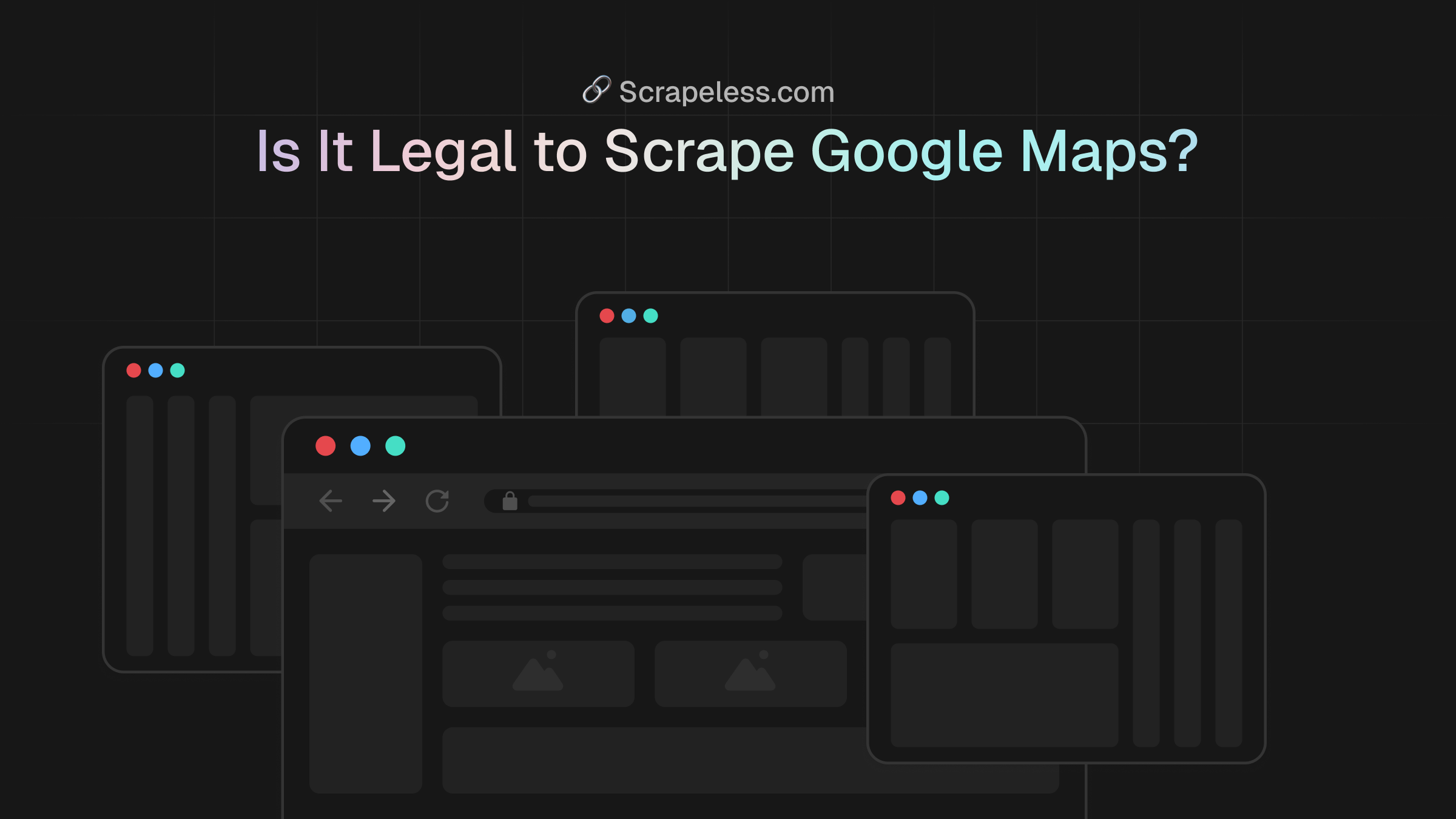Is It Legal to Scrape Google Maps?
Specialist in Anti-Bot Strategies
Although Google may express dissatisfaction with this, scraping data from Google Maps is entirely compliant at the legal level. This article will explore this phenomenon and analyze why Google attempts to prevent such behavior.
We will discuss:
- Google discourages data scraping
- But this does not mean it is illegal
- There is almost no legal risk in scraping data
- And why Google tries to prevent data scraping
Google's Stance on Data Scraping
Google has always been clear that they do not want users to scrape data from Google Maps. If you search online for "Is scraping Google Maps legal?", you will find a plethora of discussions on the topic. Some have even directly asked Google, but the usual response is that large-scale data scraping is not allowed. However, user replies on forums do not hold legal weight, so we need to delve deeper into the relevant legal provisions.
Google Maps' Terms of Service
Google's terms of service explicitly prohibit scraping, extracting, or exporting data from Google Maps, including:
- Prohibition of external hosting
- No bulk downloading allowed
- Prohibition of local storage of business information
But does this mean that scraping data is illegal? Not necessarily.
The Difference Between Legality and Permissibility
Certain actions, while not permitted, do not necessarily mean they are illegal. For example, a bar can prohibit entry to those wearing purple clothes, but wearing purple clothes itself is not illegal. Therefore, we need to explore a core question: Does the law allow scraping data from Google Maps?
Legal Feasibility of Data Scraping
Firstly, Google itself allows the promotion of scraping-related services on Google Ads. This indicates that data scraping is not classified as an illegal activity. According to U.S. law, scraping publicly accessible data is legal.
LinkedIn vs. HiQ Labs Case
In a well-known case, LinkedIn sued HiQ Labs for scraping its publicly available data. The court ruled twice:
- In 2019, the Ninth Circuit Court ruled that data scraping is not illegal
- In 2022, the court reaffirmed this ruling
This case proves that scraping publicly available data is legally permissible. Therefore, publicly available data on Google Maps can also be scraped. In fact, scraping data from Google is quite common, not only by small businesses but also by well-known tech companies. For instance, Microsoft's Bing was once accused of large-scale scraping of Google's search data but ultimately faced no legal repercussions.
Potential Risks of Scraping Google Maps Data
Although Google tries to prevent scraping, the actual risks of scraping data are relatively low.
1. Google Account Suspension
Google's terms of service grant them the right to terminate user accounts. However, most cases of scraping Google Maps data do not involve account logins, so the risk of account suspension is minimal.
2. IP Blocking
Google may temporarily block certain IPs, but such blocks are usually not permanent. Users can bypass these restrictions using proxies or other technical means.
3. Solutions for Large-Scale Scraping
If you want to avoid dealing with blocks, you can use automated scraping tools to bypass IP restrictions without writing code. Many services offer free or paid options to help users efficiently obtain the data they need.
Google's Real Reasons for Opposing Data Scraping
Although Google relies on web scraping to build its own search engine, it strictly limits others from scraping its data. The main reasons include:
- Reducing Server Load: Data scraping consumes Google's server resources, increasing operational costs.
- Protecting Revenue Sources: Google provides data services through the Google Maps API, and scraping may reduce API usage, thereby affecting its revenue.
- Maintaining Market Dominance: Google aims to prevent competitors from using its data to maintain its market dominance.
Conclusion
Although Google publicly opposes data scraping and prohibits it in its terms of service, the law does not prohibit scraping publicly accessible data. Multiple legal cases show that as long as the data is public, scraping it is not illegal. Additionally, the risks of scraping Google Maps data are relatively low, and there are mature technical means to help users bypass restrictions. Therefore, despite Google's possible dislike, data scraping remains legal.
You May also Concern
At Scrapeless, we only access publicly available data while strictly complying with applicable laws, regulations, and website privacy policies. The content in this blog is for demonstration purposes only and does not involve any illegal or infringing activities. We make no guarantees and disclaim all liability for the use of information from this blog or third-party links. Before engaging in any scraping activities, consult your legal advisor and review the target website's terms of service or obtain the necessary permissions.



